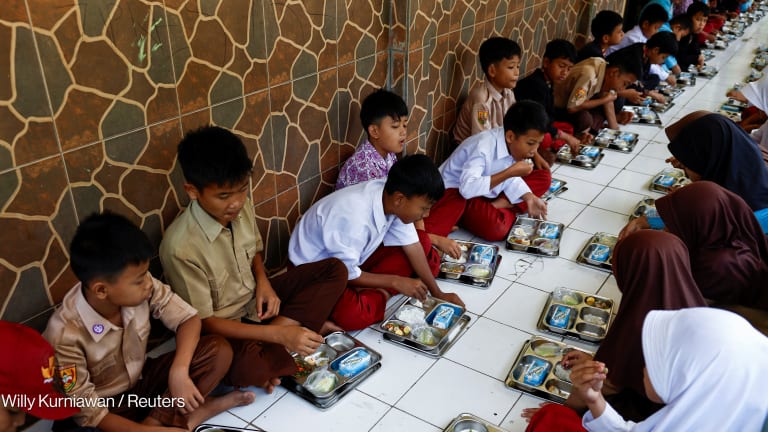
A new network of mayors and local leaders from across the world has launched an effort to generate sustainable fisheries and simultaneously build community prosperity.
Coastal 500 — launched by Rare, a conservation NGO — aims to have 500 coastal leaders pledge by 2022 “to advocate for local fishers, promote responsible fishing behavior, and endorse marine reserves.”
Currently, around 200 million people’s livelihoods are linked to coastal fisheries, and, according to the Food and Agriculture Organization of the United Nations, approximately 3 billion people depend on seafood for a significant part of their protein. That number climbs to 50% in some lower-income countries.
Yet climate change, ocean pollution, and overfishing threaten the accessibility of fish. This impacts food security, livelihoods, and nutrition.
Part of our The Future of Food Systems series
Find out how we can make food fair and healthy for all. Join the conversation using the hashtag #FoodSystems and visit our The Future of Food Systems page for more coverage.
“COVID-19 has highlighted how critical local fisheries are to local economies and local food security,” said Alexis Rife, director of small-scale fishery initiatives at the Environmental Defense Fund, adding that as global supply chains started to break down, the recognition of communities' dependency on fisheries increased.
Many small-scale fishers suffer from a lack of recognition from governments in terms of their contributions to poverty alleviation and food security, Rife said.
Political change and influence must be built to reverse the trend so that fisheries — a section of the economy which has been “marginalized, disenfranchised, and overlooked” — can be prioritized, said Steve Box, managing director at Rare’s Fish Forever program.
Calling it “the network effect,” Box said the engagement of over 500 leaders should generate a systemic shift in the way communities and governments think about how to manage their coastal zones, and break down the idea of economic growth and prosperity versus conservation.
Their collective voice within a country could elevate that onto state and provincial legislation and onto international government priorities, Box said.
“The sustainable management of fisheries lies in local solutions and innovation, and communities are best poised to safeguard their resources for a sustainable future.”
— Alexis Rife, director of small-scale fishery initiatives, Environmental Defense FundSo far, over 100 leaders — from places such as the Philippines, Indonesia, Mozambique, Guatemala, Brazil, and Honduras — have taken what Rare is calling “the pledge to protect and advocate for coastal communities.”
Earlier this year, over 50 countries also signed up to the High Ambition Coalition for Nature and People, which aims to have 30% of land and sea protected by 2030. And the U.N. has declared 2022 as the International Year of Artisanal Fisheries and Aquaculture.
Sonia Sharan, policy analyst of impact and economics at Oceana, an ocean conservation advocacy organization, said that while COVID-19 — and the subsequent reliance people had on their local fishers for food — has shone a spotlight on the contribution of fishers and shifted the narrative from economic focus to one on social wellbeing and public health, support for the sector has been building over the past few years.
In 2014, the Bloomberg Philanthropies’ Vibrant Oceans Initiative launched and now works across 13 countries to reduce harmful and illegal overfishing while also protecting coral reefs.
Last year, several small-scale fisher partners also launched the Small-Scale Fisheries Resource and Collaboration Hub, a digital platform to connect the small-scale fishing community, allowing them to access open-source tools while facilitating the sharing of experiences and best practices.
While such international efforts are key, those Devex spoke to highlighted the need for community and local-level engagement.
More on sustainable ocean economies:
► In Solomon Islands, marine protection must put livelihoods front and center
“The sustainable management of fisheries lies in local solutions and innovation, and communities are best poised to safeguard their resources for a sustainable future,” Rife said, referencing a managed access system the EDF has helped to implement in Belize, which assigns secure areas to local fishing communities for exclusive access.
In Rio Grande do Sul, Brazil, Oceana worked with local artisanal fishers to push through the Sustainable Fisheries Act, to prevent neighboring states from encroaching on the area’s fish and ban bottom trawling.
In Ghana — which has recently received its second yellow card warning from the EU for failure to prevent illegal fishing — Environmental Justice Foundation is working at a local level with fishers to report incidents of illegal fishing with a geotag and optional video through a mobile app called DASE.
It’s important that fishers themselves, echoed Sharan, be included in all international forums that NGO practitioners are involved in so they can have a say in policy and decision-making.
They should be involved from the beginning in designing and implementing marine policy and fisheries management, she said. “We really need to listen when they say they need something.”
Visit the Future of Food Systems series for more coverage on food and nutrition — and importantly, how we can make food fair and healthy for all. You can join the conversation using the hashtag #FoodSystems.





